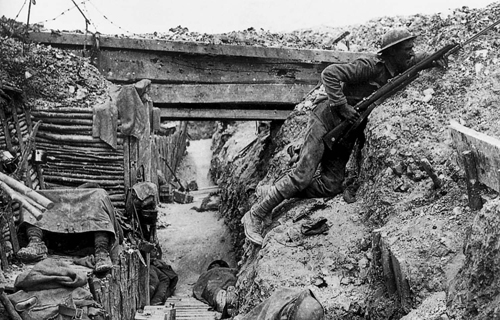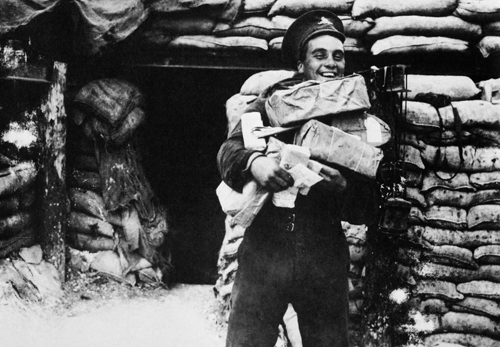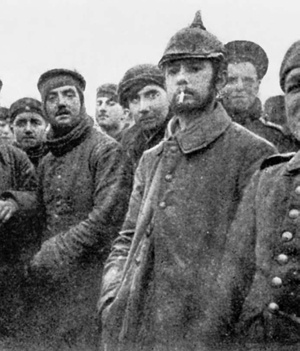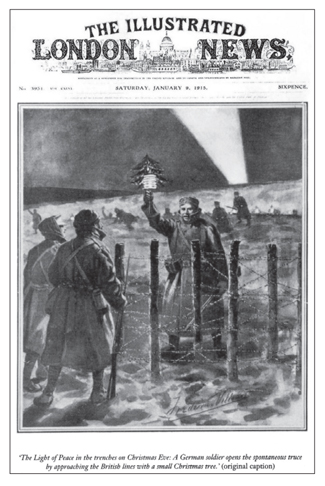Why was the Partridge in the Pear Tree? (11 page)
Read Why was the Partridge in the Pear Tree? Online
Authors: Mark Lawson-Jones

‘Adeste Fideles’.
Dom Stephan concludes his study with what he calls a rather appealing version of the first verse, echoing the cries of the Jacobites.
O hie, ye believers ! raise the song of triumph
O speed ye, 0 speed ye! to Bethlehem hie!
Born there, behold the Infant King of Angels
O come and let us worship
O come and let us worship
O come and let us worship the Lord our God!
(Revd Francis Trappes Richardson, 1868)
The story of the Jacobites and Wade, Bonnie Prince Charlie and Dom Stephan would be enough to close this chapter on ‘Adeste Fideles’. However, the remarkable history of this particular carol doesn’t end here.
Nearly 200 years after the birth of John Francis Wade, the world was plunged into war when Archduke Franz Ferdinand was assassinated on the 28 June 1914. Germany would need to meet her enemies on two fronts. When the conflict started, the German military commanders knew that the Russian Army required at least six weeks to mobilise their forces, so they concentrated on their enemies in the west by launching a strong offensive in France. Initially the French, Belgian and British forces couldn’t stop them, but eventually in France they forced a stalemate and dug in for a long winter. Trenches were dug a few hundred feet apart. Soldiers spent most of their day dealing with mud and cold, guns jammed and illness was rife. If this wasn’t bad enough, the trenches were little protection from sniper fire, and the machine guns on the battlefields were making this conflict one of the bloodiest in history.
One account, from Lieutenant Sir Edward Hulse read:
It had been pouring, and mud lay deep in the trenches; they were caked from head to foot, and I have never seen anything like their rifles! Not one would work, and they were just lying about the trenches getting stiff and cold. One fellow had got both feet jammed in the clay, and when told to get up by an officer, had to get on all fours; he then got his hands stuck in too, and was caught like a fly on a flypaper; all he could do was look round and say to his pals, ‘For Gawd’s sake, shoot me!’ I laughed till I cried. But they will shake down, directly they learn that the harder one works in the trenches, the drier and more comfortable one can keep both them and oneself.
On 17 December 1914, the first Christmas of the war, Pope Benedict XV called for a temporary truce and ceasefire on the battlefields. Germany agreed, but the other powers refused. The war had been raging for barely five months.

The trenches of the First World War.
Families had sent packages filled with cigarettes, warm clothing, gifts and medicines to the soldiers. Some of the German soldiers had also received Christmas decorations from loved ones. On Christmas Eve 1914, the German soldiers put candles in Christmas trees and decorated the edges of the trenches. Eventually, hundreds of Christmas trees appeared all across the front line. British soldiers were told to watch closely, but not to open fire.
Time and again during the course of that day, the Eve of Christmas, there were wafted towards us from the trenches opposite the sounds of singing and merry-making, and occasionally the guttural tones of a German were to be heard shouting out lustily, ‘A happy Christmas to you Englishmen!
In other areas, the two sides exchanged Christmas carols. A British soldier, Private Oswald Tilley, commented in a letter to his parents:

The
Daily Mirror
reports the Christmas Truce.
They finished their carol and we thought that we ought to retaliate in some way, so we sang ‘The first Noël’, and when we finished that they all began clapping; and then they struck up another favourite of theirs, ‘O Tannenbaum’. And so it went on. First the Germans would sing one of their carols and then we would sing one of ours, until when we started up ‘O Come All Ye Faithful’ the Germans immediately joined in singing the same hymn to the Latin words ‘Adeste Fideles’. And I thought, well, this was really a most extraordinary thing - two nations both singing the same carol in the middle of a war.
Tilley continues his letter, ‘This experience has been the most practical demonstration I have seen of Peace on earth and goodwill towards men’. Tilley even empathised with the German soldiers, ‘We hated their guts when they killed any of our friends; then we really did dislike them intensely … And we thought, well, poor so and so’s, they’re in the same kind of muck as we are.’ He concludes his letter ‘It doesn’t seem right to be killing each other at Christmas time’.
The singing from the trenches eventually turned into something completely different, as soldiers disobeyed their superior officers and fraternized with the ‘enemy’ along two-thirds of the Western Front, the 450-mile line of trenches, machine gun nests and barbed wire between the sandy dunes of the borders of Belgium and the Swiss border.
Thousands of troops streamed across a no-man’s land strewn with rotting corpses. They continued singing carols, exchanged photographs of loved ones back home, shared rations, played football, they even roasted some pigs. Soldiers embraced men they had been trying to kill and agreed to warn each other if their superior officers forced them to fire their weapons, and to aim high. In his book
The Christmas Truce
(Brown) a Corporal John Ferguson is quoted:

Deliveries of presents in the trenches.
We shook hands, wished each other a Merry Xmas, and were soon conversing as if we had known each other for years. We were in front of their wire entanglements and surrounded by Germans – Fritz and I in the centre talking, and Fritz occasionally translating to his friends what I was saying. We stood inside the circle like street-corner orators. Soon most of our company (‘A’ Company), hearing that I and some others had gone out, followed us … What a sight - little groups of Germans and British extending almost the length of our front! Out of the darkness we could hear laughter and see lighted matches, a German lighting a Scotchman’s cigarette and vice versa, exchanging cigarettes and souvenirs. Where they couldn’t talk the language they were making themselves understood by signs, and everyone seemed to be getting on nicely. Here we were laughing and chatting to men whom only a few hours before we were trying to kill!

First World War Truce, 19
January 1915.
When news of this reached the high command it was decided that action needed to be taken. Popular urban legend would have it that the soldiers stopped fighting to play football, returning to battle the next day. This was not the case; soldiers declared their solidarity and refused to fight. On both sides, generals declared the spontaneous peacemaking as ‘treasonous’ and ‘subject to court martial’. It did however take until March 1915 to fully suppress the fraternization. By the time of the Armistice in 1918, fifteen million people would have been killed.

The Illustrated London News
’ coverage of Christmas in the trenches 1914.
Perhaps for Private Tilley and the countless other soldiers on both sides, the singing of ‘Adeste Fideles’, memories of past Christmasses and the sense of the waste and futility of war led in part to this ceasefire.
Each time we hear ‘Adeste Fideles’ we can appreciate an extraordinary history of risings, war and death, but also those brave people who seek an end to war and persecutions.

Angels from the Realms of Glory
Angels from the realms of glory,
Wing your flight o’er all the earth;
Ye who sang creation’s story
Now proclaim Messiah’s birth.
Refrain
Come and worship, come and worship,
Worship Christ, the newborn King.
Shepherds, in the field abiding,
Watching o’er your flocks by night,
God with us is now residing;
Yonder shines the infant light:
Sages, leave your contemplations,
Brighter visions beam afar;
Seek the great Desire of nations;
Ye have seen His natal star.
Saints, before the altar bending,
Watching long in hope and fear;
Suddenly the Lord, descending,
In His temple shall appear.
Sinners, wrung with true repentance,
Doomed for guilt to endless pains,
Justice now revokes the sentence,
Mercy calls you; break your chains.
